(word完整版)高中非谓语动词讲解及练习(DOC)
- 格式:doc
- 大小:200.01 KB
- 文档页数:15
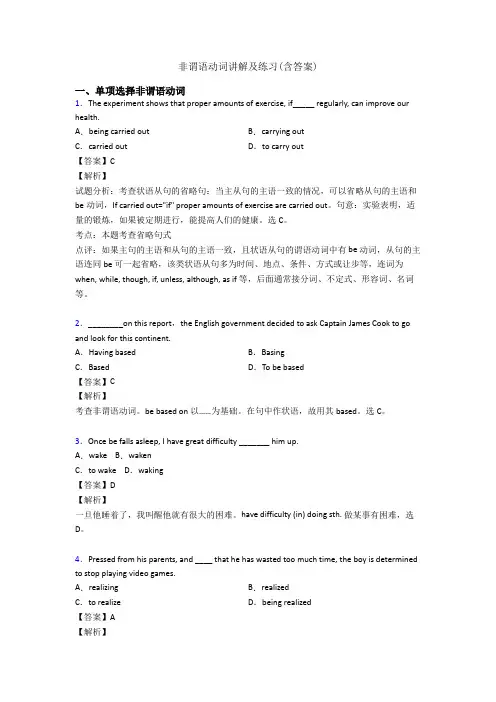
非谓语动词讲解及练习(含答案)一、单项选择非谓语动词1.The experiment shows that proper amounts of exercise, if_____ regularly, can improve our health.A.being carried out B.carrying outC.carried out D.to carry out【答案】C【解析】试题分析:考查状语从句的省略句:当主从句的主语一致的情况,可以省略从句的主语和be动词,If carried out="if" proper amounts of exercise are carried out。
句意:实验表明,适量的锻炼,如果被定期进行,能提高人们的健康。
选C。
考点:本题考查省略句式点评:如果主句的主语和从句的主语一致,且状语从句的谓语动词中有 be 动词,从句的主语连同be 可一起省略,该类状语从句多为时间、地点、条件、方式或让步等,连词为when, while, though, if, unless, although, as if 等,后面通常接分词、不定式、形容词、名词等。
2.________on this report,the English government decided to ask Captain James Cook to go and look for this continent.A.Having based B.BasingC.Based D.To be based【答案】C【解析】考查非谓语动词。
be based on以……为基础。
在句中作状语,故用其based。
选C。
3.Once be falls asleep, I have great difficulty _______ him up.A.wake B.wakenC.to wake D.waking【答案】D【解析】一旦他睡着了,我叫醒他就有很大的困难。
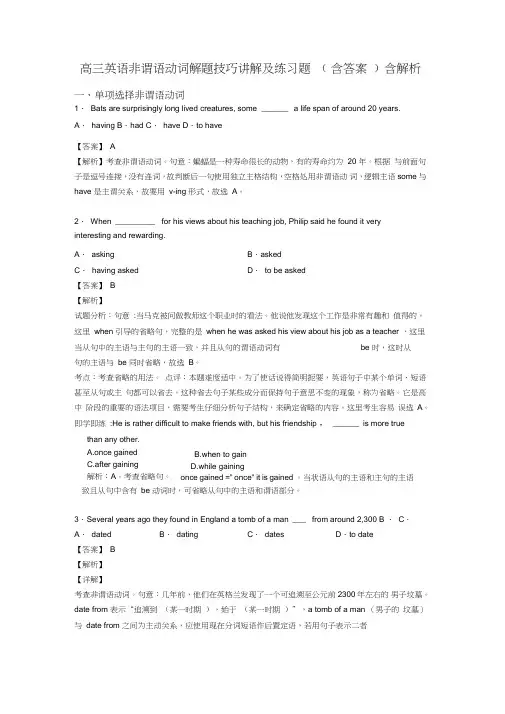
高三英语非谓语动词解题技巧讲解及练习题(含答案)含解析一、单项选择非谓语动词1.Bats are surprisingly long lived creatures, some ______ a life span of around 20 years. A.having B.had C.have D.to have【答案】A【解析】考查非谓语动词。
句意:蝙蝠是一种寿命很长的动物,有的寿命约为20 年。
根据与前面句子是逗号连接,没有连词,故判断后一句使用独立主格结构,空格处用非谓语动词,逻辑主语some 与have 是主谓关系,故要用v-ing 形式,故选A。
2.When _________ for his views about his teaching job, Philip said he found it veryinteresting and rewarding.A.asking B.askedC.having asked D.to be asked【答案】B【解析】试题分析:句意:当马克被问做教师这个职业时的看法。
他说他发现这个工作是非常有趣和值得的。
这里when 引导的省略句,完整的是when he was asked his view about his job as a teacher ,这里当从句中的主语与主句的主语一致,并且从句的谓语动词有be 时,这时从句的主语与be 同时省略,故选B。
考点:考查省略的用法。
点评:本题难度适中。
为了使话说得简明扼要,英语句子中某个单词、短语甚至从句或主句都可以省去。
这种省去句子某些成分而保持句子意思不变的现象,称为省略。
它是高中阶段的重要的语法项目,需要考生仔细分析句子结构,来确定省略的内容。
这里考生容易误选A。
即学即练:He is rather difficult to make friends with, but his friendship , ______ is more true than any other.A.once gainedC.after gaining解析:A。
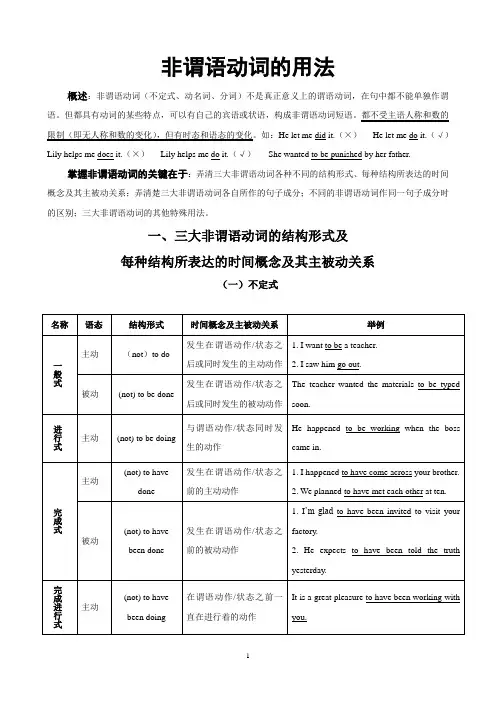
非谓语动词的用法概述:非谓语动词(不定式、动名词、分词)不是真正意义上的谓语动词,在句中都不能单独作谓语。
但都具有动词的某些特点,可以有自己的宾语或状语,构成非谓语动词短语。
都不受主语人称和数的限制(即无人称和数的变化),但有时态和语态的变化。
如:He let me did it.(×)----He let me do it.(√)Lily helps me does it.(×)----Lily helps me do it.(√)She wanted to be punished by her father.掌握非谓语动词的关键在于:弄清三大非谓语动词各种不同的结构形式、每种结构所表达的时间概念及其主被动关系;弄清楚三大非谓语动词各自所作的句子成分;不同的非谓语动词作同一句子成分时的区别;三大非谓语动词的其他特殊用法。
一、三大非谓语动词的结构形式及每种结构所表达的时间概念及其主被动关系(一)不定式(二)动名词(三)分词二、三大非谓语动词各自所充当的句子成分非谓语动词具有各自不同的词类特征,因此充当的句子成分也各不相同。
不定式具有名词、动词、形容词和副词的特性,在句中可以作主语、宾语、表语、定语、状语和宾语补足语;动名词具有名词和动词的特性,在句中可以作主语、宾语、表语和定语;分词具有动词、形容词和副词的特性,在句中可以作表语、定语、状语和宾语补足语。
(见下面的图表)。
不定式:主语、宾语、表语、定语、状语、宾补动名词:主语、宾语、表语、定语分词:表语、定语、状语、宾补附:三大非谓语动词的区别一览表注意:当由现在分词和过去分词变化而来的形容词与定冠词连用表示一类人或事物时,可以作主语或宾语。
如:the dying,the wounded等。
三、不同的非谓语动词作同一句子成分时的区别(一)、作主语(不定式和动名词作主语的区别):1. 所表动作的具体含义不同:不定式作主语多表示具体的、一次性的动作;动名词作主语多表示经常性的、习惯性的动作。
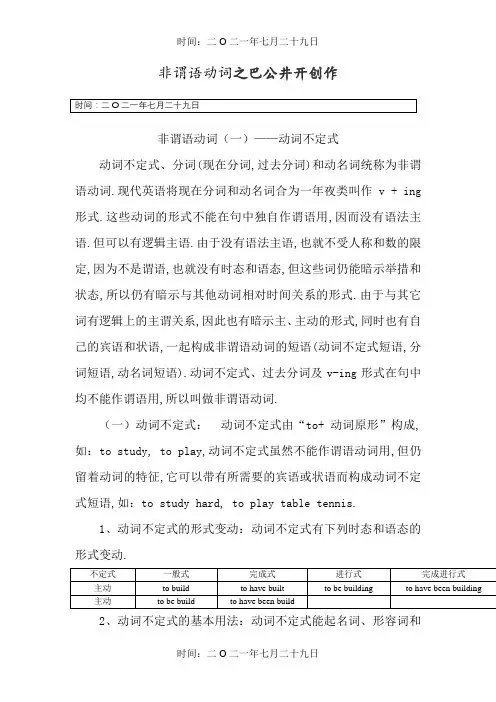
非谓语动词之巴公井开创作非谓语动词(一)——动词不定式动词不定式、分词(现在分词,过去分词)和动名词统称为非谓语动词.现代英语将现在分词和动名词合为一年夜类叫作v + ing 形式.这些动词的形式不能在句中独自作谓语用,因而没有语法主语.但可以有逻辑主语.由于没有语法主语,也就不受人称和数的限定,因为不是谓语,也就没有时态和语态,但这些词仍能暗示举措和状态,所以仍有暗示与其他动词相对时间关系的形式.由于与其它词有逻辑上的主谓关系,因此也有暗示主、主动的形式,同时也有自己的宾语和状语,一起构成非谓语动词的短语(动词不定式短语,分词短语,动名词短语).动词不定式、过去分词及v-ing形式在句中均不能作谓语用,所以叫做非谓语动词.(一)动词不定式:动词不定式由“to+ 动词原形”构成,如:to study, to play,动词不定式虽然不能作谓语动词用,但仍留着动词的特征,它可以带有所需要的宾语或状语而构成动词不定式短语,如:to study hard, to play table tennis.1、动词不定式的形式变动:动词不定式有下列时态和语态的形式变动.2、动词不定式的基本用法:动词不定式能起名词、形容词和副词的作用,可在句中作主语、表语、宾语补足语、定语和状语用,如:(1)作主语:To help each other is good.(动词不定式作主语时,一般可用it作形式主语,而将作主语的动词不定式置于句末,如:It is good to help each other.(2)作表语:My job is to drive them to the power station every day. 动词不定式在系动词be之后作表语,与暗示将来时的be + 动词不定式结构有所区别,如:Our plan is to set up another middle school for the peasants’ children.我们的计划是给农民子弟再成立一所中学.(句中的谓语动词为is,动词不定式to set up… 为表语,主语为plan,但plan其实不是动词不定式的逻辑主语,即动词不定式 to set up所暗示的举措不是主语plan发生的.)We are to set up another middle school for the peasants’ children.我们将为农民的子弟再成立一所中学.(句中的are to set up整个结构为句中谓语,主语为we,同时也是动词不定式to set up所暗示的举措的逻辑主语,即动词不定式to set up所暗示的举措是由we发生的).(3)作宾语:①作及物动词的宾语,如:She wishes to be a musician.;②作某些形容词的宾语:可以有动词不定式为宾语的形容词一般有glad, sorry, afraid, pleased, determined, willing, eager, anxious, ready, sure等,如:I am determined to give up smoking.;③动词不定式一般不作介词的宾语,但动词不定式之前如有疑问词时,就可作介词的宾语,如:Can you give us some advice on what to do next?(4)作宾语补足语,如:Tell the children not to play on the street. 如果句中的谓语动词为see, hear, watch, notice, have, make, let等,作宾语补足语的动词不定式须将to省去,如:I saw a little girl run across the street.(5)动词不定式在句中作宾语,如带有宾语补足语时,须先用it作形式宾语,而将该动词不定式后置,如:I don’t think it right to do it that way.(6)作定语:动词不定式作定语时,须位于被其修饰的名词或代词之后,如:Is this the best way to help him? 和定语用的动词不定式如果是不及物动词,不定式后面就要用需要的介词,如:He is the man to depend on. 如果被不定式修饰的名词为place, time, way,不定式后面的介词,习惯上可以省去,如:The old man is looking for a quiet place to live.(7)作状语:动词不定式可以作下列的状语:①目的状语:Every morning he gets up very early to read English. 为了强调不定式暗示目的的作用,可在不定式前加in order to或so as to(以便或为了),但应注意in order to位于句首或句中均可,而so as to不能位于句首,如:She reads China Daily every day in order to (so as to) improve her English. 将暗示目的的不定式置于句首,也可强调目的的作用,如:To master a foreignlanguage, one must work hard at it. ②结果状语:They lived to see the liberation of their home town.他们活到亲眼见到了他们家乡的解放.③too + 形容词或副词 + 动词不定式,暗示“足能…”的结果,如:You are old enough to take care of yourself now.3、复合结构不定式:由for + 名词(或代词宾格)+ 动词不定式即构成复合结构的动词不定式.其中for自己无意义.for后面的名词或代词是不定式的逻辑主语,这种不定式在句中可作主语、表语、宾语、定语或状语,如:It is very important for us to get everything ready for the harvest. 看成表语用的形容词暗示不定式的逻辑主语的性质或特征时,就用介词of而不用for引出不定式的逻辑主语,这些形容词一般有good, nice, kind, wise, silly, stupid, foolish, right, wrong, careless, impolite等,如:It is very kind of you to help him every day.4、疑问词 + 动词不定式:疑问代词和疑问副词后可加动词不定式构成不定式短语,在句中可作主语、表语或宾语,如:How to prevent them from swimming in this river is a problem.5、动词不定式的否定式:动词不定式的否定式是由not + 动词不定式构成,如:It’s wrong of you not to attend the meeting.6、动词不定式的时态形式所暗示的时间关系:(1)一般式:动词不定式一般式所暗示的举措是和谓语动词所暗示的举措同时发生,但在大都情况下,是在谓语动词所暗示的举措之后发生,如:We decided to plant more trees this spring.(其后),They often watch us play table tennis.(同时);(2)完成式:动词不定式完成式所暗示的举措发生在谓语动词所暗示的举措之前,如:I am sorry to have kept you waiting.(3)进行式:动词不定式进行式所暗示的举措正在进行中,而且与谓语动词所暗示的举措同时发生,如:She happened to be writing a letter in the room when I came in.7、动词不定式的主动语态用法:如果动词不定式的逻辑主语为这个不定式所暗示的举措的接受者时,不定式一般就用主动语态形式,如:What is to be done next hasn’t been decided yet.非谓语动词(二)——动词-ing形式(二)-ing形式:动词的-ing形式也是一种非谓语动词.-ing 形式仍保管有动词的特征,可以带有其所需要的宾语或状语而构成-ing短语.1、-ing的形式:-ing有一般式和完成式.及物动词的-ing还有主动语态和主动语态,而不及物动词的-ing则没有主动语态.现在以及物动词make 和不及物动词go为例,将其-ing各种形式列表如下:2、-ing形式的基本用法.(1)作主语:Seeing is believing.百闻不如一见.Talking iseasier than doing. –ing作主语时,如果其结构较长,可用it 作形式主语,而将作主语的-ing后置.如:It isn’t much good writing to them again. It’s no use waiting here.(2)作表语:Her job is washing and cooking. My hobby is collecting stamps.(3)作宾语:①作及物动词的宾语.She likes drawing very much.;②作某些短语动词的宾语. Mary is thinking of going back to New York.;③ do+限定词(my, some, any, the等)+ -ing,暗示“做…事”之意,如:We often do our cleaning on Saturday afternoon. Will you do any shopping on Saturday this afternoon? ④作介词的宾语:Her sister is good at learning physics.;⑤作形容词worth, busy等的宾语:This book is well worth reading. –ing作宾语带有宾语补足语时,要用it作为形式宾语,而将作宾语的-ing后置,如:We found it no good talking like that. Do you think it necessary trying again?(4)作定语:The sleeping child is only five years old. Do you know the man standing at the gate? 注:-ing形式作定语用时,如果-ing只是一个单词,就位于其修饰的名词之前,如果是-ing短语,就位于其修饰的名词之后,-ing作定语时,被-ing所修饰的名词就是该-ing的逻辑主语.另外,-ing作定语用时,其举措和句子谓语动词所暗示的举措是同时进行的,如果不是同时进行的,就不能用-ing作定语,要使用定语从句,如:The girl who wrotea letter there yesterday can speak English very well.(5)作宾语补足语:We can see steam rising from the wet clothes. 注:当-ing在复合宾语中作宾语补足语用时,句中宾语就是这个-ing的逻辑主语,可以带有这种复合宾语的动词有see, watch, hear, observe, feel, find, have, keep等.(6)作状语:①时间状语:Seeing Tom, I couldn’t help thinking of his brother. 分词在句中作时间状语时,其前一般可加when或while,如:When crossing street, you must be careful.②原因状语:Being ill, he didn’t go to school yesterday. ③方式或陪伴状语:Mary stood at the school gate waiting for Betty.3、主动语态-ing完成式的基本用法.主动语态-ing完成式所暗示的举措发生在句中谓语动词所暗示的举措之前,一般在句中作时间或原因状语用.句中的主语是它的逻辑主语,而且是它所暗示的举措的执行者,如:Having answered the letter, she went on to read an English novel.4、主动语态-ing一般式的基本用法.主动语态-ing一般式所暗示的举措是一个正在进行中的主动举措,而且这个主动举措也是和句中谓语所暗示的举措同时发生的.它一般在句中作定语或状语用.如:The truck being repaired there is ours.5、主动语态-ing完成式的基本用法.主动语态-ing完成式所暗示的举措发生在谓语动词所暗示的举措之前,在句中一般作状语用.如:Having been shown the lab, we were taken to see the library.6、-ing形式的复合结构.在-ing前加物主代词或名词所有格即构成-ing的复合结构.其中的物主代词或名词所有格为-ing的逻辑主语.这种结构在句中可作主语、宾语或表语,如:Your smoking and drinking too much will do harm to your health. 但在口语中,这种结构如作宾语用,其中的物主代词经常使用人称代词的宾格,名词的所有格经常使用名词的普通格取代,如:She insisted on Peter’s (or Peter)going there first.7、-ing形式与动词不定式在句中作主语、表语、宾语时的区别.一般说来,暗示一个比力笼统或泛指的举措时多用-ing形式.暗示一个具体某一次的举措时,多用动词不定式,如:Our job is making steel. She likes playing the piano, but she doesn't want to play it today.8、-ing形式与动词不定式在句中作定语的区别.-ing形式作定语用时,其举措一般与句中谓语动词所暗示的动词同时发生,而动词不定式作定语时,其举措一般发生在句中谓语动词所暗示的举措之后.如:The girl writing a letter there can speak English very well./I have three letters to write.9、-ing形式与动词不定式在作宾语补足语时的区别.(1)不定式作宾补时,其举措一般发生在谓语动词所暗示的举措之后,如:I have told them to come again tomorrow.(2)在see, watch,hear, feel等之后,如果用-ing形式作宾补,暗示其举措正在进行中,而用不带to的不定式作宾补时,不定式所暗示的举措是一个举措的过程,如:I hear her singing in the room.我听见她正在屋里唱歌. I hear her sing in the room.我听见她在屋里唱过歌.10、-ing形式与动词不定式在句中作状语的区别.-ing形式在句作状语暗示时间、原因、方式或陪伴情况,而动词不定式一般式在句中作状语时,一般是作目的或结果状语,如:Not receiving his letter, I wrote to him again./ I looked into the window to see what was going on inside.非谓语动词(三)——过去分词( 三)过去分词:1、过去分词的基本用法:过去分词只有一种形式,也没有主动语态,它所暗示的举措是一个主动的或是已完成的举措.过去分词在句中也可用作定语、表语、宾语或状语等成份.过去分词在句中作某种成份时,其逻辑主语一般为该分词所暗示的举措的接受者,如:(1)作定语:过去分词作定语时,如果这个分词是一个单词,就位于其修饰的名词之前,如果是分词短语,就位于其修饰的名词之后.被过去分词所修饰的名词,就是该分词的逻辑主语,如:The stolen car was found by the police last week.(2)作表语:过去分词作表语时,暗示其逻辑主语所处的状态,其逻辑主语就是句中的主语,如:The glass is broken.这个玻璃杯是破的. 注:过去分词作表语时,和动词的主动语态结构相似,但两者表达的意义分歧,如:The glass was broken by my little brother.这个玻璃杯是被我小弟弟打破的.作表语用的过去分词在许多辞书中已列为形容词,如:crowded, devoted, discouraged, done, dressed, drunk, experienced, frightened, gone, hurt, interested, killed, known, learned, lost, pleased, satisfied, shut, surprised, tired, undressed,worried, astonished, broken, completed, covered等.(3)作宾语补足语:过去分词作宾语补足语时,句中的宾语就是其逻辑主语,如:When I opened the door, I found the ground covered by fallen leaves. 注:动词have后的复合宾语中,宾语补足语如为过去分词,常暗示该分词所暗示的举措是由他人来执行的而不是句中主语自己来执行的,如:I had my bike repaired yesterday. 昨天我(找他人)把我的自行车给修了.(4)作状语:过去分词作状语时,相当于一个状语从句,该结构的逻辑主语一般都是主句的主语,是过去分词所暗示意义的逻辑宾语.为了使作状语的过去分词意义更加明确,常在分词前加when, if, while, though, as等连词,如:Seen from the hill/ When seen from the hill, our town looks beautiful.; Given more time/ If given more time, we could have done it better.(we是该结构的逻辑主语,是give的逻辑宾语.)自力主格:上述-ing和过去分词的用法中,-ing和过去分词在句中均有逻辑主语,但有时它们也能有自己的自力的主语,这种自力的主语,一般为名词或代词,位于其前之前,和-ing或过去分词构成自力主格.自力主格在句中一般只作状语用,而-ing和过去分词作用的形式,则要根据它们所暗示的举措和句中谓语动词所暗示的时间关系而定.至于自力主格中是使用-ing或是过去分词,则要根据它们的主语和其所暗示的举措的主动主动关系而定,如:The bell ringing, we all stopped talking. 注:The work having been fini shed, she sat down to have a rest. ①自力结构中的being 或having been常可省去,如:The meeting (being) over, all left the room. ②作陪伴状语的自力结构常可用with短语来取代,如:She read the letter, tears rolling down her cheeks./ She read the letter with tears rolling down her cheeks.2、-ing形式与过去分词的区别:(1)语态分歧:-ing形式暗示主动概念,及物动词的过去分词暗示主动概念.an inspiring speech鼓舞人心的演说;the inspired audience受鼓舞的听众.(2)时间关系分歧:现在分词所暗示的举措一般是正在进行中的举措,而过去分词所暗示的举措,往往是已经完成的举措,如:The changing world正在发生的世界;the changed world已经起了变动的世界.易错易混点1.疑问词+动词不定式:疑问代词和疑问副词后可加动词不定式构成不定式短语,在句中可作主语、表语或宾语,如:How to prevent them from swimming in this river is a problem.2.动词不定式的否定式:由not +动词不定式构成.3.v.-ing形式与动词不定式在句中作主语、表语、宾语时的区别.v.-ing形式:暗示笼统或泛指的举措.不定式:暗示具体某一次的举措.She likes playing the piano, but she doesn't want to play it today.4.v.-ing形式与动词不定式在句中作定语的区别.v.-ing形式:举措与谓语动词所暗示的举措同时发生.不定式:举措发生在谓语动词所暗示的举措之后.eg. The girl writing a letter there can speak English very well.I have three letters to write.5.v.-ing形式与动词不定式在作宾语补足语时的区别.(1)不定式作宾补时,其举措一般发生在谓语动词所暗示的举措之后,如:I have told them to come again tomorrow.(2)在see, watch, hear, feel等之后,如果用v.-ing形式作宾补,暗示其举措正在进行中,而用不带to的不定式作宾补时,不定式所暗示的举措是一个举措的过程,如:I hear her singing in the room. 我听见她正在屋里唱歌.I hear her sing in the room. 我听见她在屋里唱过歌.6.v.-ing形式与动词不定式在句中作状语的区别.v.-ing形式:暗示时间、原因、方式或陪伴情况.不定式:作目的或结果状语.7.v.-ing形式与过去分词的区别:(1)语态分歧:v.-ing形式暗示主动概念,及物动词的过去分词暗示主动概念.an inspiring speech鼓舞人心的演说; the inspired audience受鼓舞的听众(2)时间关系分歧:现在分词所暗示的举措一般是正在进行中的举措,而过去分词所暗示的举措,往往是已经完成的举措,如:the changing world正在变动的世界 the changed world 已经变动了的世界8.自力主格结构:有时v.-ing和过去分词在句中也有自己的自力的主语,这种自力的主语一般为名词或代词,和v.-ing还有过去分词构成自力主格结构.该结构在句中一般只作状语. 自力主格中是使用v.-ing还是过去分词,则要根据它们的主语和其所暗示的举措的主动或被动关系来定,如:The bell ringing, we all stopped talking.注意:①自力结构中的being或having been常可省去,如:The meeting_(being)_over, all left the room.②作陪伴状语的自力结构常可用with短语来取代, 如:She read the letter, tears rolling down her cheeks.= She read the letter with tears rolling down her cheeks.非谓语的解题步伐或思路(1)先判断空格部份所需的是主句,从句还是非谓语动词.自力的句子, 从句或非谓语自力的句子加句号,分号或破折号的话,后再加一个自力的句子.自力的句子,(逗号)有and,but, so 等词加自力的句子.(2)再根据主句的主语,来判断主动或主动;(3)接下来再判断时态,(4)如果是否定的话,not一定要放在非谓语的前面(5)一定不要忘记主语一致的原则,如果纷歧致的话,要把非谓语的自力主语加上.非谓语罕见的位置,或在句子中所担负的成份(1)非谓语动词短语, + 主句或者是主句, 非谓语动词短语这时的非谓语动词短语起到状语的作用例如: influenced by the growing interest in nature, more people enjoy outdaoor activities.在这种情况下,首先,找出主句的主语,然后以主句的主语为动身点,来判断非谓语动词是主动还是主动,如果已有的非谓语动词的主语和主句主语纷歧致,还要考虑自力主格结构,也就是把非谓语动词的自己的主语加上去:例如: All flights having been cancelled , they decided to take the train. 其次,把非谓语动词和主句的动词比力,看是否同时发生还是有明显的先后.(2)跟在介词,动词或某些形容词的后面固定搭配只接动词-ing形式而不接不定式作宾语的动词有:admit 供认 appreciate 感激 avoid 防止 put off 推迟 keep 坚持consider 考虑 delay/ postpone 担搁 dislike 嫌恶 resist 抵抗 mention 提及enjoy 喜欢escape 防止excuse 原谅practice 练习 mind介意 fancy想不到 feel like 意欲 finish 完成 risk 冒险 include 包括forgive 原谅give up 放弃suggest 建议miss 逃过 imagine 想象can’t help 情不自禁 involve 需要can’t stand 无法忍受 understand 理解罕见的带介词to的短语: be used to 习惯 be related to 与……有关get down to 着手做contribute to 贡献put one’s mind to 全神贯注于 give rise to 引起 be equal to 胜任 devote oneself to 献身于lead to 招致 be opposed to 反对 look forward to 盼望object to 反对stick to 坚持 pay attention to 注意(3)介词后一定要加动词的-ing 形式;(4)跟在名词后面做定语时, 一般不用having done/ having been done 结构(5)放在句首做主语 , 一般用动词的ing 和to do …特殊的非谓语短语Generally speaking 一般来说Consi dering …. 考虑到,鉴于 Time/weather permitting 时间、天气允许的话Taking …into account 考虑到Taking …into consideration 考虑到Provided …假如Providing…假如Suppose…假如Supposing…假如 Judging from/ by…根据…判断 Given sth 假如,如果;鉴于,考虑到Given that…假如,如果;鉴于,考虑到 including sth (sth included)包括某事非谓语动词基础练习1. He looked around and caught a man ______ his hand into thepocket of a passenger. A. put B. to be putting C. to putD. putting2. When you’re learning to drive, _______ a good teacher makes a big difference.A. haveB. havingC. and haveD. and having3. I felt it a great honor ______ to speak to you.A. to askB. askingC. to be askedD. having asked4. I would love _______ to the party last night but I had to work extra hours to finish a report.A. to goB. to have goneC. goingD. having gone5. Before you decide to leave your job, _______ the effect it will have on your family.A. considerB. consideringC. to considerD. considered6. Robert is said _______ abroad, but I don’t know what country he studied in.A. to have studiedB. to studyC. to be studyingD. to have been studying7. It is said that in Australia there is more land than the government knows _______.A. it what to do withB. what to do it withC. what to do with itD. to do what with it8. Anyone _______ bags, boxes, or whatever, was stopped by the police.A. seen carryB. seen carryingC. saw to carryD. saw carrying9. Mr Reed made up his mind to devote all he had to _______some schools for poor children. A. set up B. setting upC. have set upD. having set up10. The discovery of new evidence led to _______.A. the thief having caughtB. catch the thiefC. the thief being caughtD. the thief to be caught11. She looks forward every spring to _______ the flower-lined garden.A. visitB. paying a visitC. walk inD. walking in12. To test eggs, _______ them in a bowl of water: if they float they’re bad, if they sink they’re good.A. putB. puttingC. to putD. to be putting13. “Where is David?”“H e is upstairs ______ ready to go out.”A. to getB. gettingC. to be gettingD. having got14. “Mum, why do you always make me eat an egg every day?”“________ enough protein and nutrition as you are growing up.”A. GetB. GettingC. To getD. to be getting15. He was reading his book, completely _______ to the world.A. lostB. losingC. to loseD. to have lost16. We looked everywhere for the keys, but they are nowhere _______.A. to findB. to have foundC. to be foundD. being found17. The boy wanted to ride his bicycle in the street, but hismother told him _______.A. not toB. not to doC. not do itD. do not do18. A cook will be immediately fired if he is found _______ in the kitchen.A. smokeB. smokingC. to smokeD. smoked19. Finding her car stolen, _______.A. a policeman was asked to helpB. the area was searching thoroughlyC. it was looked for everywhereD. she hurried to a policeman for help20. “How do you deal with the disagreement between the company a nd the customers?”“The key ______ the problem is to meet the demand ______ by the customers.”A. to solving, makingB. to solving, madeC. to solve, makingD. to solve, made21. “What do you think made Mary so upset?”“_______ her new bike.”A. As she lostB. LostC. LosingD. Because of losing22. The research is so designed that once _______ nothing can be done to change it.A. beginsB. having begunC. beginningD. begun23. Though ________ money, his parents managed to send himto university.A. lackedB. lacking ofC. lackingD. lacked in24. Tony was very unhappy for _______ to the party.A. having not been invitedB. not having invitedC. having not invitedD. not having been invited25. Though I have often heard this song _______. I have never heard you _______ it.A. being sung, sangB. sang, singingC. sung, singD. to be sung, to sing非谓语动词提高练习1. The great hall was crowded with many people, __ many children __on their parents’ lapA. including; seatedB. including; seatingC. included; satD. included; sitting2. It’s said that the Olympic Games _____ in Beijing in 2008 will cover more events than any other Olympics did.A. holdingB. to be heldC. heldD. to be holding3. _____ for a long time, most of the crops in this area died from lacking water.A. Being no rainB. There was no rainC. To be no rainD. There being no rain4. Yesterday a street-beggar bought a lottery ticket purposelessly, _____ him a millionaire overnight.A. makingB. makesC. to makeD. made5. In the face of the big fire in October in California, manypeople in the fire-stricken areas moved out _____.A. to escape burningB. to escape being burnedC. escaping burnedD. escaping from burning6. Taking this medicine, if _____, will of course do good tohis health.A. continuedB. to continueC. continuesD. continuing7. The little boy still needs the _____ 20 dollars to do withsome things _____.A. remaining; remained to be settledB. remaining;remaining to be settledC. remained; remained to settleD. remained;remaining to settle8. _____ his age, the little boy read quite well.A. ConsideringB. ConsideredC. ConsiderD. Having considered9. _____ from the appearance, it is very peaceful; but in fact,a war will break out soon.A. JudgedB. JudgingC. Having judgedD. To judge10. — Tom enjoys _____ basketball on Sunday afternoons, doesn’t he? —Yes, he does. But what his sister enjoys_____.A. to play; dancingB. playing; to danceC. to play; to danceD. playing; is to dance11. His letter, _____ to the wrong number, reached me late.A. having been addressedB. to have addressedC. to have been addressedD. being addressed12. The Space Shuttle Columbia broke into pieces over Texasas it returned to the earth on February 1, 2003,_____ all seven astronauts aboard.A. having killedB. killingC. being killedD. killed13. There are lots of places of interest _____ in our city.A. needs repairingB. needing repairedC. needed repairingD. needing to be repaired14. — What caused the party to be put off? — _____ the invitations.A. Tom delayed sendingB. Tom’s delaying sendingC. Tom delaying to sendD. Tom delayed to send15. I was afraid _____ to my customers because I was afraid_____ them.A. of talking back; to loseB. of talking back; of losingC. to talk back; to loseD. to talk back; of losing16. Standing on the top of the hill, I would not do anythingbut _____ the flowing of the smog around me.A. enjoyB. enjoyingC. enjoyedD. to enjoy17. — Is Tom a good talker? — No, he never speaks tome other than _____ something?A. ask forB. to ask forC. asked forD. asking for18. I can’t get my car _____ on cold mornings, so I have totry _____ the radiator with some hot water.A. run; to fillB. running; fillingC. running;to fill D. ran; filling19. The drunken husband knocked against the table and sentthe bowls _____ in all directions before he was sent _____by his wife.A. flying; to sleepB. flying; sleepingC. to fly; to sleepingD. to fly; to sleep20. When we got back from the cinema, we found the lamp _____but the door _____.A. being on; shutB. burning; shuttingC. burning;shut D. on; shutting21. We found the students seated at tables and had their eyes_____ on the scene of the launch of Shenzhou V spaceship.A. fixedB. fixC. fixingD. to fix22. A doctor can expect _____ at any hour of the day or night.A. callingB. to callC. being calledD.to be called23. The boy often gives a satisfactory answer to the teacher’s question, _____ just a minute. So he’s usuallythe teacher’s pet.A. thoughtB. having thoughtC. and to thinkD. thinking24. The policeman came up to the lonely house with the door____, ____ there for a while and then entered it.A. open; to standB. opening; stoodC. open; stoodD. opened; standing25. _____ along the quiet road at forty miles an hour, andthen an old man suddenly started to cross the road in frontof me.A. DrivingB. I was drivingC. Having drivenD. When I was driving26. Mr. Smith was much surprised to find the watch he had had_____ was nowhere to be seen.A. repairingB. it repairedC. repairedD. to be repaired27. What did the librarian _____ out of the library?A. permit to takeB. forbid to be takenC. allow to takeD. insist being taken28. —Mum, why do you give me so much popcorn? — _____the boring time.A. KillB. KillingC. To killD. Having killed29. What Yang Liwei wanted to do when he got out of the spaceship was __ the joy with all the Chinese.A. shareB. sharedC. having sharedD. about to share30. When she was alone at home, Mary needed a friend _____.A. playing withB. having played withC. with whom to play withD. with whom to play31. _____ the big snake, the little girl stood under the tree_____ out of life.A. Seeing; frightenedB. Seeing; frighteningC. Seen; frightenedD. To see; frightening32. The competitor never dreamed of _____ for him to win thefirst prize in the 100-meter race.A. there was a chanceB. there being a chanceC. it being a chanceD. it was a chance33. _____ everything to go wrong in advance, and you won’tfeel quite so bad when it does.A. Having expectedB. ExpectC. To expectD. Expecting34. — You _____ part in the party on time. — Sorry, I was delayed by the accident.A. are to takeB. have supposed to takeC. were to have takenD. supposed to take 35. _____ with the size of the whole earth, the highest mountain doesn’t seem high at all.A. When comparedB. To compareC. While comparingD. It compared36. _____ in her best suit, the girl tried to make herself_____ at the party.A. Dressed; noticedB. Dressing; noticingC. Dressed; noticingD. Dressing; noticed37. The matter _____ your study surely requires _____ carefully.A. relating to; dealing withB. related to;dealt withC. related to; being dealt withD. relating to;having dealt with38. _____ made her parents worried a lot.A. Her not to come backB. Not her to come backC. Her not coming backD. Not her coming back39. Everything _____ into consideration, they believed themselves more and returned to their positions.A. to takeB. takenC. to be takenD. taking40. He moved away from his parents and missed them _____ enjoythe exciting life in New York.A. much so as toB. very much toC. too much toD. enough to41. —What do you think of the plan? —It’s easier saidthan _____.A. carried outB. carrying outC. carry outD.to carry out42. Many businessmen attended the Boao Forum (博鳌论坛)because they knew what _____ from the forum.A. to getB. to be gotC. gotD. getting43. There was a famous person at the party whom everyone wouldlike _____ to themselves. A. to introduce B. tobe introduced C. introducing D. beingintroduced44. —Were you at home last Sunday? —Yeah! I devotedthe whole day to _____ the English grammar.A. reviewB. reviewingC. be reviewedD. being reviewed45. Once _____ at the shop, you will be dismissed immediately.A. caught stealingB. caught to stealC. catching stealingD. to catch to steal46. Prices of daily goods _____ through a computer can belower than store prices.A. are boughtB. boughtC. been boughtD.buying47. _____, John returned to school from his hometown.A. The summer vacation being overB. The summer。
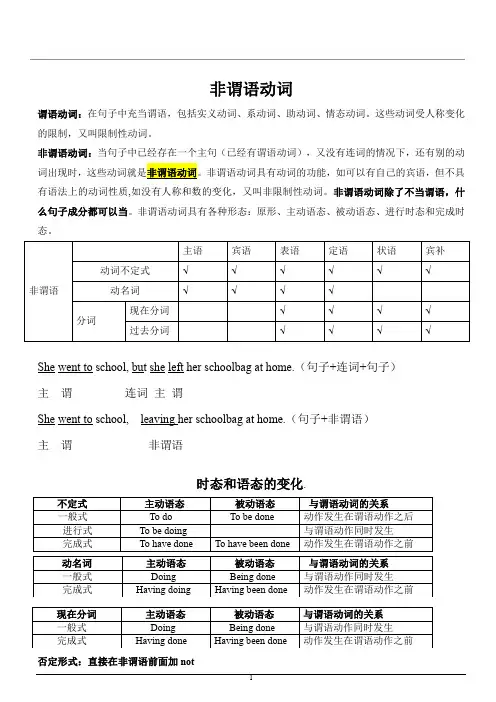
非谓语动词谓语动词:在句子中充当谓语,包括实义动词、系动词、助动词、情态动词。
这些动词受人称变化的限制,又叫限制性动词。
非谓语动词:当句子中已经存在一个主句(已经有谓语动词),又没有连词的情况下,还有别的动词出现时,这些动词就是非谓语动词。
非谓语动词具有动词的功能,如可以有自己的宾语,但不具有语法上的动词性质,如没有人称和数的变化,又叫非限制性动词。
非谓语动词除了不当谓语,什么句子成分都可以当。
非谓语动词具有各种形态:原形、主动语态、被动语态、进行时态和完成时态。
非谓语主语 宾语 表语 定语 状语 宾补 动词不定式√ √ √ √ √ √ 动名词√ √ √ √ 分词现在分词 √ √ √ √ 过去分词√√√√She went to school, but she left her schoolbag at home.(句子+连词+句子) 主 谓 连词 主 谓She went to school, leaving her schoolbag at home.(句子+非谓语) 主 谓 非谓语时态和语态的变化.不定式 主动语态 被动语态 与谓语动词的关系一般式 To do To be done 动作发生在谓语动作之后 进行式 To be doing与谓语动作同时发生 完成式 To have done To have been done 动作发生在谓语动作之前否定形式:直接在非谓语前面加not动名词 主动语态 被动语态 与谓语动词的关系 一般式 Doing Being done 与谓语动作同时发生 完成式 Having doing Having been done 动作发生在谓语动作之前 现在分词 主动语态 被动语态 与谓语动词的关系 一般式 Doing Being done 与谓语动作同时发生 完成式Having doneHaving been done动作发生在谓语动作之前不定式:to +动词原形和动名词:V-ing一、不定式和动名词共同的功能(一)作主语不定式动名词1.直接作主语相同点:不定式和动名词作主语时,谓语用单数。
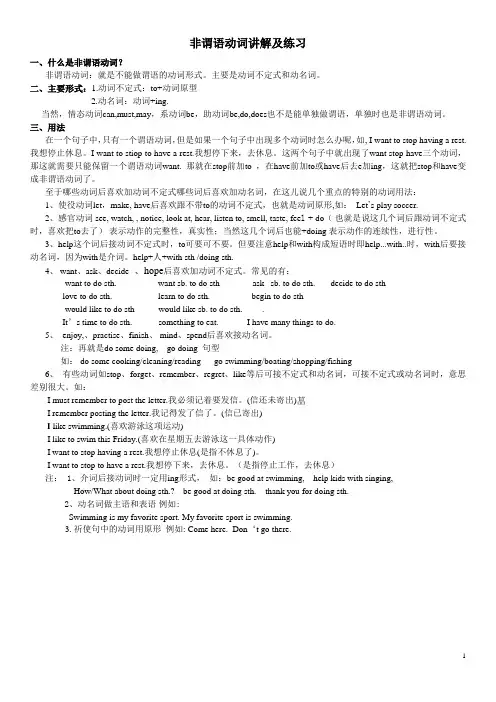
非谓语动词讲解及练习一、什么是非谓语动词?非谓语动词:就是不能做谓语的动词形式。
主要是动词不定式和动名词。
二、主要形式:1.动词不定式:to+动词原型2.动名词:动词+ing.当然,情态动词can,must,may,系动词be,助动词be,do,does也不是能单独做谓语,单独时也是非谓语动词。
三、用法在一个句子中,只有一个谓语动词,但是如果一个句子中出现多个动词时怎么办呢,如, I want to stop having a rest.我想停止休息。
I want to stiop to have a rest.我想停下来,去休息。
这两个句子中就出现了want stop have三个动词,那这就需要只能保留一个谓语动词want. 那就在stop前加to ,在have前加to或have后去e加ing,这就把stop和have变成非谓语动词了。
至于哪些动词后喜欢加动词不定式哪些词后喜欢加动名词,在这儿说几个重点的特别的动词用法:1、使役动词let,make, have后喜欢跟不带to的动词不定式,也就是动词原形,如:Let’s play soccer.2、感官动词 see, watch, , notice, look at, hear, listen to, smell, taste, fee l + do(也就是说这几个词后跟动词不定式时,喜欢把to去了)表示动作的完整性,真实性;当然这几个词后也能+doing 表示动作的连续性,进行性。
3、help这个词后接动词不定式时,to可要可不要。
但要注意help和with构成短语时即help...with..时,with后要接动名词,因为with是介词。
help+人+with sth /doing sth.4、want、ask、decide、hope后喜欢加动词不定式。
常见的有:want to do sth. want sb. to do sth ask sb. to do sth. decide to do sthlove to do sth. learn to do sth. begin to do sthwould like to do sth would like sb. to do sth. .It’s time to do sth. something to eat. I have many things to do.5、enjoy,、practise、finish、 mind、spend后喜欢接动名词。
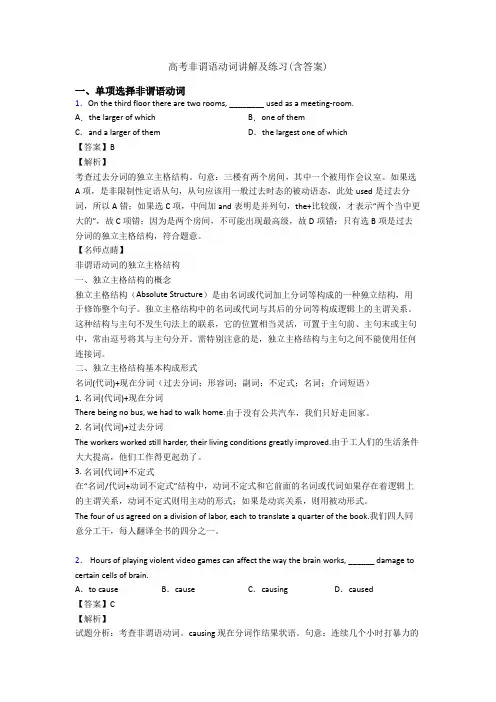
高考非谓语动词讲解及练习(含答案)一、单项选择非谓语动词1.On the third floor there are two rooms, ________ used as a meeting-room.A.the larger of which B.one of themC.and a larger of them D.the largest one of which【答案】B【解析】考查过去分词的独立主格结构。
句意:三楼有两个房间,其中一个被用作会议室。
如果选A项,是非限制性定语从句,从句应该用一般过去时态的被动语态,此处used是过去分词,所以A错;如果选C项,中间加and表明是并列句,the+比较级,才表示“两个当中更大的”,故C项错;因为是两个房间,不可能出现最高级,故D项错;只有选B项是过去分词的独立主格结构,符合题意。
【名师点睛】非谓语动词的独立主格结构一、独立主格结构的概念独立主格结构(Absolute Structure)是由名词或代词加上分词等构成的一种独立结构,用于修饰整个句子。
独立主格结构中的名词或代词与其后的分词等构成逻辑上的主谓关系。
这种结构与主句不发生句法上的联系,它的位置相当灵活,可置于主句前、主句末或主句中,常由逗号将其与主句分开。
需特别注意的是,独立主格结构与主句之间不能使用任何连接词。
二、独立主格结构基本构成形式名词(代词)+现在分词(过去分词;形容词;副词;不定式;名词;介词短语)1. 名词(代词)+现在分词There being no bus, we had to walk home.由于没有公共汽车,我们只好走回家。
2. 名词(代词)+过去分词The workers worked still harder, their living conditions greatly improved.由于工人们的生活条件大大提高,他们工作得更起劲了。
3. 名词(代词)+不定式在“名词/代词+动词不定式”结构中,动词不定式和它前面的名词或代词如果存在着逻辑上的主谓关系,动词不定式则用主动的形式;如果是动宾关系,则用被动形式。
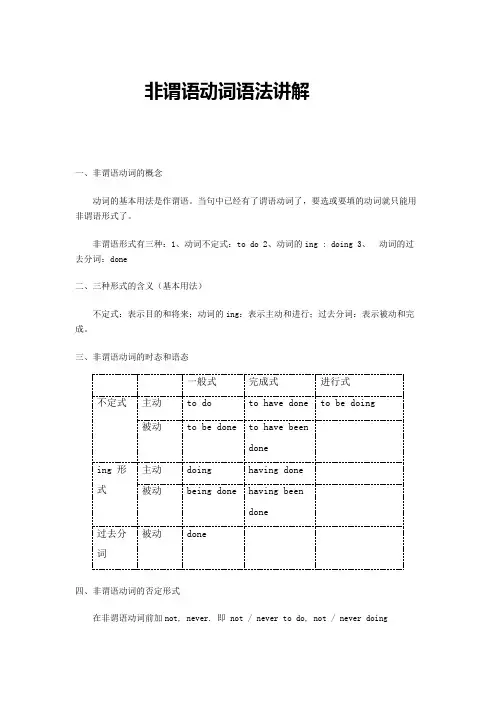
非谓语动词语法讲解一、非谓语动词的概念动词的基本用法是作谓语。
当句中已经有了谓语动词了,要选或要填的动词就只能用非谓语形式了。
非谓语形式有三种:1、动词不定式:to do 2、动词的ing : doing 3、动词的过去分词:done二、三种形式的含义(基本用法)不定式:表示目的和将来;动词的ing:表示主动和进行;过去分词:表示被动和完成。
三、非谓语动词的时态和语态一般式完成式进行式不定式主动to do to have done to be doing被动to be done to have beendoneing 形式主动doing having done 被动being done having beendone过去分词被动done四、非谓语动词的否定形式在非谓语动词前加not, never. 即 not / never to do, not / never doing五、非谓语动词的复合结构不定式的复合结构:for / of sb. to do sth.动词 ing 形式的复合结构:宾格或所有格+doing (-ing 形式作主语时,用的所有格+doing)六、非谓语动词的做题步骤1、判定是否用非谓语形式。
方法:看看句子中是否已有了谓语动词了2、找非谓语动词的逻辑主语。
方法:非谓语动词的逻辑主语一般是句子的主语。
3、判断主被动关系。
方法:非谓语动词与其逻辑主语的主动还是被动关系。
4、判断时间关系。
方法:分析句子,看看非谓语动词所表示的动作发生在谓语动作之前、之后还是同时。
之前常用 done; 之后常用to do; 同时常用doing.学习非谓语形式时,建议把三种形式一起来比较学习,会更加有效一些。
七、非谓语动词作主语和表语的比较1、不定式和动名词作主语和表语a. 不定式表示一次性的、具体的动词。
动词ing 常表示一般的、泛指的或习惯性的动作。
如:________ is a good form of exercise for both young and old.A. The walkB. WalkingC. To walkD. Walk(分析) a good form 暗示泛指一般的行为,用动名词作主语,选 Bb. 不定式作主语时,常用it 作形式主语,即用句型:It is + adj. / n. + (for / of sb. ) to do sth.It’s important for us to learn English well.It’s kind of you to help us.注意:下面几个句型是用动名词:It’s no good / use doing sth.It’s usel ess doing sth.There is no need to do sth.2、不定式、动名词、分词作表语的比较1、不定式、动名词作表语,.表示主语的内容。
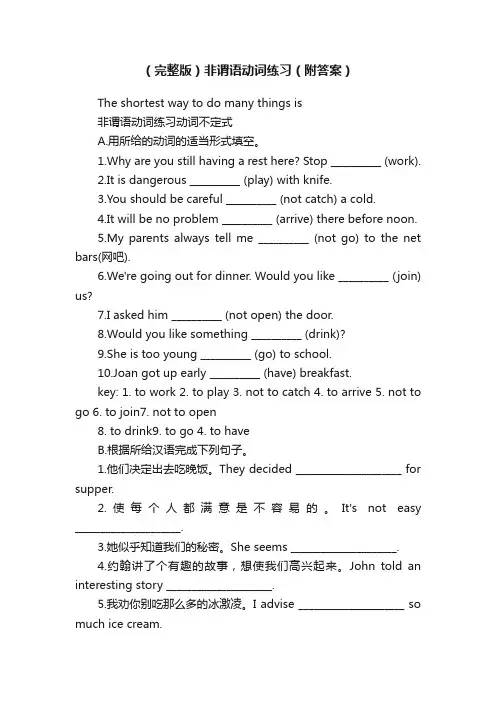
(完整版)非谓语动词练习(附答案)The shortest way to do many things is非谓语动词练习动词不定式A.用所给的动词的适当形式填空。
1.Why are you still having a rest here? Stop __________ (work).2.It is dangerous __________ (play) with knife.3.You should be careful __________ (not catch) a cold.4.It will be no problem __________ (arrive) there before noon.5.My parents always tell me __________ (not go) to the net bars(网吧).6.We're going out for dinner. Would you like __________ (join) us?7.I asked him __________ (not open) the door.8.Would you like something __________ (drink)?9.She is too young __________ (go) to school.10.Joan got up early __________ (have) breakfast.key: 1. to work 2. to play 3. not to catch 4. to arrive 5. not to go 6. to join7. not to open8. to drink9. to go 4. to haveB.根据所给汉语完成下列句子。
1.他们决定出去吃晚饭。
They decided _____________________ for supper.2.使每个人都满意是不容易的。
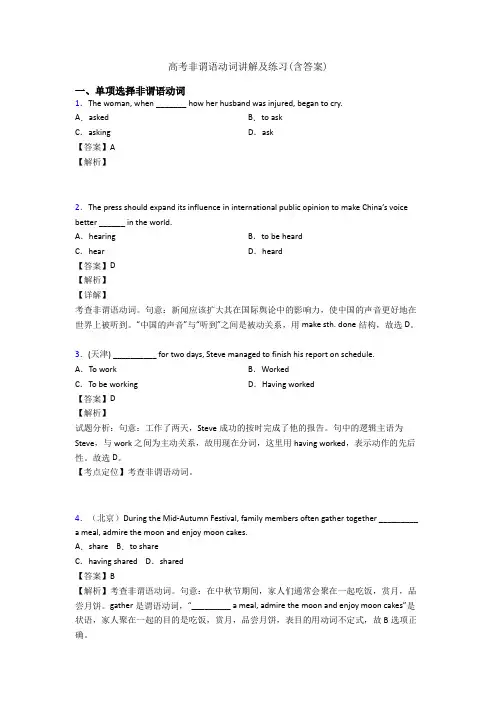
高考非谓语动词讲解及练习(含答案)一、单项选择非谓语动词1.The woman, when _______ how her husband was injured, began to cry.A.asked B.to askC.asking D.ask【答案】A【解析】2.The press should expand its influence in international public opinion to make China’s voice better ______ in the world.A.hearing B.to be heardC.hear D.heard【答案】D【解析】【详解】考查非谓语动词。
句意:新闻应该扩大其在国际舆论中的影响力,使中国的声音更好地在世界上被听到。
“中国的声音”与“听到”之间是被动关系,用make sth. done结构,故选D。
3.(天津) __________ for two days, Steve managed to finish his report on schedule.A.To work B.WorkedC.To be working D.Having worked【答案】D【解析】试题分析:句意:工作了两天,Steve成功的按时完成了他的报告。
句中的逻辑主语为Steve,与work之间为主动关系,故用现在分词,这里用having worked,表示动作的先后性。
故选D。
【考点定位】考查非谓语动词。
4.(北京)During the Mid-Autumn Festival, family members often gather together _________ a meal, admire the moon and enjoy moon cakes.A.share B.to shareC.having shared D.shared【答案】B【解析】考查非谓语动词。
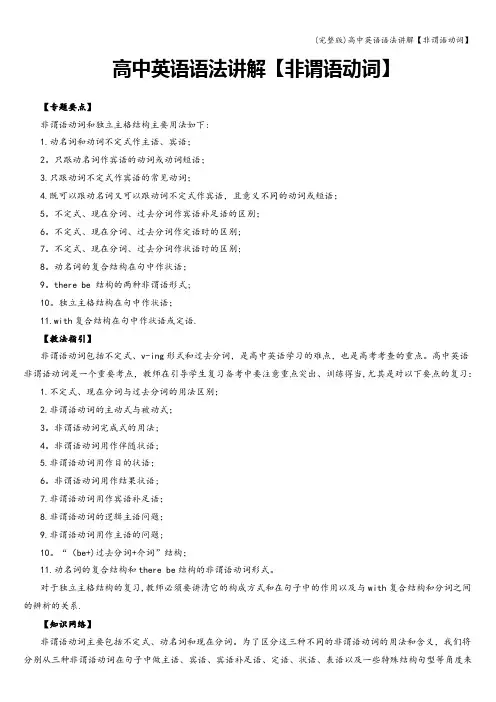
高中英语语法讲解【非谓语动词】【专题要点】非谓语动词和独立主格结构主要用法如下:1.动名词和动词不定式作主语、宾语;2。
只跟动名词作宾语的动词或动词短语;3.只跟动词不定式作宾语的常见动词;4.既可以跟动名词又可以跟动词不定式作宾语,且意义不同的动词或短语;5。
不定式、现在分词、过去分词作宾语补足语的区别;6。
不定式、现在分词、过去分词作定语时的区别;7。
不定式、现在分词、过去分词作状语时的区别;8。
动名词的复合结构在句中作状语;9。
there be 结构的两种非谓语形式;10。
独立主格结构在句中作状语;11.with复合结构在句中作状语或定语.【教法指引】非谓语动词包括不定式、v-ing形式和过去分词,是高中英语学习的难点,也是高考考查的重点。
高中英语非谓语动词是一个重要考点,教师在引导学生复习备考中要注意重点突出、训练得当,尤其是对以下要点的复习:1.不定式、现在分词与过去分词的用法区别;2.非谓语动词的主动式与被动式;3。
非谓语动词完成式的用法;4。
非谓语动词用作伴随状语;5.非谓语动词用作目的状语;6。
非谓语动词用作结果状语;7.非谓语动词用作宾语补足语;8.非谓语动词的逻辑主语问题;9.非谓语动词用作主语的问题;10。
“(be+)过去分词+介词”结构;11.动名词的复合结构和there be结构的非谓语动词形式。
对于独立主格结构的复习,教师必须要讲清它的构成方式和在句子中的作用以及与with复合结构和分词之间的辨析的关系.【知识网络】非谓语动词主要包括不定式、动名词和现在分词。
为了区分这三种不同的非谓语动词的用法和含义,我们将分别从三种非谓语动词在句子中做主语、宾语、宾语补足语、定语、状语、表语以及一些特殊结构句型等角度来区分其用法和细微含义。
1.不定式和动名词作主语的区别(1)动名词作主语通常表示抽象动作;而不定式作主语表示具体动作.Smoking is prohibited(禁止)here.这里禁止抽烟。
【英语】非谓语动词解说及练习(含答案)一、单项选择非谓语动词1.The film star wears sunglasses. Therefore, he can go shopping without ___________. A.recognizing B.being recognizedC. having recognized D. having been recognized【答案】 B【分析】试题剖析:本题考察动词的非谓语动词形式。
句意:那位电影明星戴上墨镜。
所以,他去买东西不会被认出来。
依据题中的介词without判断,今后应当使用动词的动名词形式,因为他是被人认出的,所以应当用动名词的被动式,所以选B。
考点:考察非谓语动词的用法2.(天津 ) The hospital has recently obtained new medical equipment, ________ more patients to be treated.A. being allowed B.allowingC. having allowed D. allowed【答案】 B【分析】【详解】考察非谓语动词。
句意:近期这个医院购进了新的医疗设施,同意更多的病人被治疗。
前句购进医疗设施和后边同意更多的病人被治疗之间是必定的结果关系,用doing 即此刻分词作结果状语,表示理所应当的结果。
A. being allowed 表示被动且正在进行; C. having allowed 重申先于谓语动词发生; D. allowed 表示被动且达成,应选B。
【点睛】判断非谓语动词的形式的第一步是剖析句子成分,看是用谓语动词仍是非谓语动词,确立了是非谓语动词,还要判断非谓语动词的成分,和这个动词和逻辑主语的关系。
3.________ by the advances in technology, many farmers have set up wind farms on their land. A. Being encouraged B.EncouragingC. Encouraged D. Having encouraged【答案】 C【分析】试题剖析:考察过去分词做状语:句意:被科技的进步激励着,好多农民在自己的土地上建起了风力发电厂。
非谓语动词短语作定语讲解及练习1.不定式作定语,要放在它所修饰的名词之后,表示一个将来的动作。
2.分词作定语,单个的放在所修饰的名词前(left 等除外),短语放在所修饰的名词后。
现在分词表示其动作正在发生或与谓语同时发生,过去分词表示其动作已经完成或没有时间性;在逻辑上被修饰的名词与现在分词是主谓关系,与过去分词是被动关系。
3.动名词作定语,只放在名词前,说明该名词的性能或用途,不表动作,被修饰的名词与-ing 形式在逻辑上没有主谓关系。
4.to be done, being done, done 均可用作定语,且都表示被动意义,其区别在于:to be done 表示将来,being done 表示目前正在发生,done 表示过去已经发生。
高考考点:非谓语动词,即不定式、-ing分词和-ed分词作定语的用法较灵活,是高考重点考查内容之一。
高考对非谓语动词作定语的考查主要包括以下几个方面的内容:1.不定式作定语;2.-ing分词作定语;3.-ed分词作定语1.非谓语动词短语做定语(形式)*非谓语的完成式(having done和having been done)不做定语,只做状语。
【典型例题】1.(北京2000, 单项填空)The picture _______ on the wall is painted by my nephew.A. having hungB. hangingC. hangsD. being hung正确答案:B 根据题干判断,句中需要一个既作定语又表状态的非谓语动词,所以选B。
2.(NMET97,单项填空)The Olympic Games,______in 776 B.C., did not include womenplayers until 1912.A. first playingB. to be first playedC. first playedD. to be first playing正确答案:C 此题考查分词作非限制性定语的用法,有被动意义,动作已完成,所以选C。
非谓语动词作状语全解不定式和分词作状语的用法一、不定式作状语可以作:1。
主要用作目的状语。
常与 in order to do (为了或 so as to do(以便连用。
so as to 不用于居首。
He got up early in order to catch the first bus. 他早起为了赶上第一班车。
He sat down to have a rest。
他坐下来休息。
He went to France to learn French. 他去法国学习法语.They stood by the roadside to talk about the plan.他们站在路边为的是谈论这个计划。
They stopped to ask the way. 他们停下来问路. (停下来的目的2。
作结果状语。
表示出乎意料的结果。
做结果状语的不定式只能出现在句子的末尾,常见的不定式动词有:to find, to hear, to see, to be told, to form, to give, to make,to produce 等。
He hurried to the station only to find the train gone. 他匆匆忙忙地赶到火车站,发现火车已经开走了.He woke up to find everybody gone。
他醒来发现大家都走了。
His family was too poor to support him。
他的家庭太穷,不能维持他的生活. The boy is not tall enough to reach the book shelf。
这男孩个子不够高, 手伸不到书架。
He is old enough to go to school。
他到上学年龄了.He lifted a rock only to drop it on his own feet.他搬起石头砸了自己的脚。
非谓语动词解说及练习( 含答案 )一、单项选择非谓语动词1.New York is the fashion capital of the world, says a new study on Feb 4. 2014 by the Global Language Monitor (GLM), Pairs ____ second, with Shanghai ______10 th while Hongkong 20 th. A. coming, ranks B. come, ranked C.comes, ranking D.coming, ranking【答案】 D【分析】 D 考察非谓语动词。
句意: 2 月 4 日的一项新研究表示,纽约是世界的时髦之都。
2014 年全世界语言监测机构 (GLM)排名第二,上海排名第10,香港排名第20。
Come 和Pair 是主动关系用动词 ing 形式, rank 与 Shanghai 是主动关系,用动词 ing形式,应选 D。
2.China ’ s Chang ’ e 4 robotic probe entered lunar orbit on Wednesday, ________ a major step in its mission to make a soft landing on the moon’ s far side.A. marking C. having marked B.to mark D. marked【答案】 A【分析】【详解】考察非谓语动词。
句意:周三,中国的嫦娥 4 号机器人探测器进入月球轨道,标记着它在月球远端软着陆任务中迈出了重要一步。
逗号前是主句,逗号后是非限制性定语,修饰整个主句,联合句意,主句和mark之间是主动关系,故用此刻分词作定语, A 选项正确。
【点睛】不定式和此刻分词均可用结果状语,但二者用法有差别:此刻分词用作结果状语,往常表示一种自然的结果,即属料想之中的事;不定式用作结果状语,主要表示没有预想到的状况或结果,即属料想以外的事。
非谓语动词讲解及练习(含答案)一、单项选择非谓语动词1.Moving to Canada for higher education has been exciting. On the first day of term, there were crowds of people in the dormitory, all where they should go.A.looked for B.looking for C.were looking for D.had been looking for【答案】B【解析】【详解】考查非谓语动词。
句意:到加拿大接受高等教育令人兴奋,开学第一天,宿舍挤满了人,大家都在找自己该去的地方。
People与look for是逻辑上的主谓关系,表示主动,用现在分词作伴随状语,故B项正确。
2.Pressed from his parents, and ____ that he has wasted too much time, the boy is determined to stop playing video games.A.realizing B.realizedC.to realize D.being realized【答案】A【解析】试题分析:考查非谓语动词的用法。
句意:被父母迫使同时自己也意识到他已经浪费了太多时间,这个男孩决定停止玩电脑游戏。
首先要弄清楚本句中的and连接的成分是非谓语动词做状语,主语the boy与press是被动关系,但是与realize是主动,所以是现在分词做状语,选A。
3.—Come on,please give me some ideas about the project.—Sorry.With so much work _______ my mind,I almost break down.A.filled B.filling C.to fill D.being filled【答案】B【解析】“with+复合结构”在句中表状态或说明背景情况,常作伴随、方式、原因、条件等状语,该结构由“名词(代词)+不定式、形容词、副词、介词短语、动词-ing形式、动词-ed形式等”构成。
英语语法——非谓语动词在解非谓语习题时同学们遇到最大的困难有两个:一是如何判别是谓语动词还是非谓语动词;二是如何选用哪一种非谓语动词及其恰当的形式。
例题一.____tired of Tom’s all-talk-no-action attitude, Julia decided to do the job all by herself.A) To get B) To have gotC) Getting D) Have got一般来说,在句子中没有连接词的情况下, 逗号是无力连接两个句子的。
据此,首先可以确定这是一个简单句,非谓语动词短语放在句首作状语。
依据非谓语动词短语get tired of与其逻辑主语Julia之间的主动关系,以及谓语动词与非谓语动词所表示的动作几乎同时发生,没有明显的先后顺序,可以断定应用现在分词一般式作原因状语,即“由于厌倦了Tom只说不做的工作态度”,故正确答案为C。
例题二____ that Bob had got promoted, his friends came to congratulate him.A) Heard B) Having heardC) Hear D) To hear依据非谓语动词hear与其逻辑主语his friends之间的主动关系,以及前后句的逻辑关系,可以断定用现在分词形式来作时间状语,再根据现在分词的动作“听说”发生在主要谓语动词“来”之前,由此判断应该用现在分词的完成式(只用作状语时使用),意为“听说Bob已得到提升,他的朋友都来向他表示祝贺”,故正确答案为B。
非谓非谓语语法功能的比较注意:the bridge to be built 将建造的桥, the bridge being built 正在建造的桥,the bridge built已经建好的桥非谓语动词高考考点【考点一】不定式作状语不定式作状语时相当于一个状语从句,不定式作状语时往往用来作目的状语、结果状语或原因状语。
1.不定式用来作目的状语:作目的状语时,不定式的逻辑主语通常也是全句的主语,这里往往译作“为了,想要”。
To be a winner,you need to give all you have and try your best.要想成为赢家,你要付出所有并竭尽全力。
2.不定式用于so...as to ...,such...as to;enough to;too...to;only to等结构中作结果状语。
(1)Would you be so kind as to lend me your bicycle?你能不能行行好,借给我你的自行车?(2)He is such a fool as to think that his strange behaviour can inflect others.他如此愚蠢以至于认为他奇怪的行为会影响他人。
(3)He hurried to the booking office only to have been told all the tickets had been sold out.他匆忙去了售票处,结果被告诉所有的票已经卖完了。
注意:“only+to do”表示出乎意料的结果,tell 和主语He 之间存在动宾关系,因而应用不定式的被动结构。
而现在分词作结果状语则表示自然而然的结果。
(4)His parents died,leaving him an orphan.他的父母去世了,使他成为孤儿。
【经典考题】1. There were many talented actors out there just waiting________. A.to discover B.to be discoveredC.discovered D.being discovered2.—Why are the students working so hard these days.—________ready for the coming entrance examination.A.To get B.GetC.Getting D.Got3.With Father’s Day around the corner,I have taken some money out of the bank ________ presents for my dad.A.buy B.to buyC.buying D.to have bought【考点二】过去分词作状语1.过去分词作状语和现在分词作状语一样,修饰主句的谓语动词,意义上相当于状语从句,表示时间、原因、条件、伴随状况等。
(1)Given the right kind of training,these teenager soccer players may one day grow into international stars.如果得到正确的训练,这些少年足球选手有朝一日可能成为国际明星。
(2)Reminded not to miss the flight at 15∶20,the manager set out for the airport in a hurry.得到提醒不要错过15∶20的航班,他匆忙出发过了机场。
2.某些动词的过去分词已经形容词化,且往往用于一些系表结构中。
此时这些过去分词既不表示被动,也不表示完成,而表示一种状态,这样的词有:lost(迷路的),seated(坐),hidden(躲),lost/absorbed in(沉溺于),dressed in(穿着),tired of(感到厌倦)等,不管它们作什么成分都不用其ing形式。
Lost in the mountains for a week,we were finally saved by the local police.在大山里迷失一个星期,我们最终被当地警察所救。
Absorbed in his book,he didn’t notice me enter the room.专心读书,他没注意到我进入房间。
【经典考题】1. ________from the top of the tower,the south foot of the mountain is a sea of trees.A.Seen B.SeeingC.Having seen D.To see2.Michael’s new house is like a huge palace,________with his old one. A.comparing B.comparesC.to compare D.compared【考点三】现在分词作状语1.动词的ing 短语作状语表示在进行一动作的同时所进行的另一动作,它对谓语动词起修饰和陪衬的作用。
动词的ing形式作状语可以表示时间、原因、条件、让步、结果、方式或伴随情况。
(1)Being ill,he couldn’t go to school.因为生病,他不能去上学。
(原因)(2)My car was caught in a traffic jam,thus causing the delay.我的车被交通拥挤堵住,所以延误了。
(结果)(3)As the light turned green,I stood for a moment,not moving,and asked myself what I was going to do.(伴随)当交通路灯变绿灯时,我站了一会儿,一动不动,自问要做什么事。
2.现在分词有:一般式、被动式、完成式和完成被动式四种形式,每一种形式的否定式都是直接在前面加not 构成。
一般式(doing)表示主动的一般性的动作或者正在进行的动作;被动式(being done)表示正在进行的被动的动作;完成式(having done)表示发生在谓语动作之前的主动的动作;完成被动式(having being done)表示发生在谓语动作之前的被动的动作。
(1)Not having received a reply,he decided to write again.没有得到答复,他决定再写信去。
(2)The old man,having worked abroad for twenty years,came back to his motherland.(work 与句子的主语The old man之间存在主谓关系,而且work这一动作发生在谓语动作之前)在国外工作了二十年,这位老人回到了祖国。
(3)Having been scolded many times,he determined to study hard to catch up with others.多次被批评之后,他决定努力学习赶上他人。
3(记住).有一些固定结构,如:generally speaking,taking everything into consideration,judging from/by等,无论主语是什么都用这种形式作状语。
(1)Taking everything into consideration,the result is better than expected.把一切因素考虑进去,结果比预料的要好。
(2)Judging from what he said,he must be an honest man.从他说的话来判断,他一定是一位诚实的人。
4.现在分词和过去分词作状语的区别:如果是意义上的主谓关系,一般用现在分词形式;如果是意义上的动宾关系,则一般用过去分词。
(1)Seen from the top of the hill,the park looks even more beautiful. 从山顶上看,这个公园显得更加美丽。
(see 与主语the park之间存在动宾关系)(2)Seeing from the top of the hill,we find the park even more beautiful. 从山顶上看,我们发现这个公园显得更加美丽。
(see与主语we之间存在主谓关系)【经典考题】1. Dina,________for months to find a job as a waitress,finally took a position at a local advertising agency.A.struggling B.struggledC.having struggled D.to struggle2.________at my classm ates’ faces,I read the same excitement in their eyes.A.Looking B.LookC.To look D.Looked3.________a written permission,he had to write another letter to the president of the university.A.Not giving B.Not having been givenC.Having not given D.Having not been given【考点四】非谓语动词作定语1.现在分词(短语)作定语与所修饰的名词之间存在着逻辑上的主谓关系,表示该动作的主动和进行。